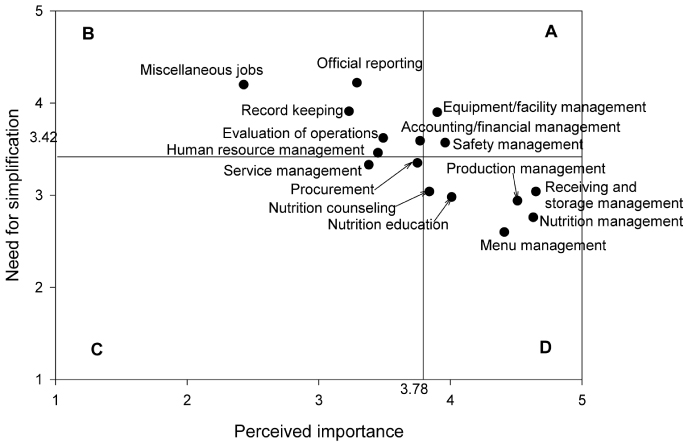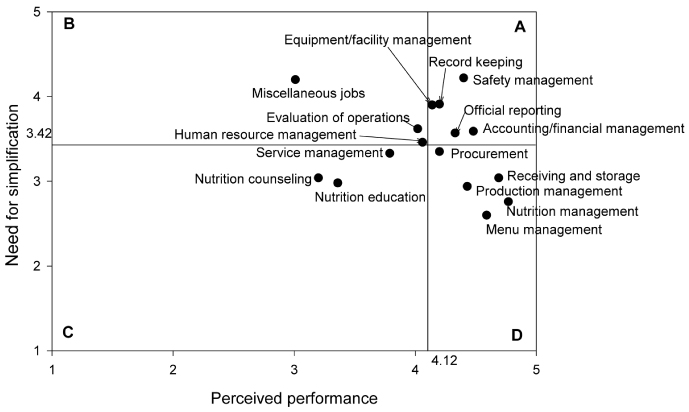Korean J Community Nutr.
2016 Feb;21(1):12-24. 10.5720/kjcn.2016.21.1.12.
Job Perception and the Need for Job Improvement among School Nutrition Teachers in Seoul
- Affiliations
-
- 1Shinjeong Elementary School, Seoul, Korea.
- 2Department of Food and Nutrition, Seoul Women's University, Seoul, Korea. klee@swu.ac.kr
- 3Association of School Nutrition Teachers, Korea.
- KMID: 2269398
- DOI: http://doi.org/10.5720/kjcn.2016.21.1.12
Abstract
OBJECTIVES
The objectives of the study were to investigate the school nutrition teachers' perception on their job and to find out recommendations needed for its improvement in order to provide a quality foodservice and nutrition education at schools.
METHODS
A total of 219 school nutrition teachers in Seoul were surveyed using self-administered questionnaires.
RESULTS
The perceived importance of the 16 job duties was rated 3.8 based on a 5-point scale (1: very unimportant - 5: very important). The importance of six duties including nutrition management, production management, nutrition education, and food safety management were rated over 4 point but that of record-keeping for documents, official reporting, and service management was rated the lowest. Importance-Performance Analysis showed that nutrition management, receiving/storage management, production management, menu management, food safety management, and equipment/facilities management should be emphasized to maintain the current performance of duties. The performance of the nutrition education and counseling needed to be improved since the importance scores were greater than average but the performance scores were lower than the average. Official reporting and miscellaneous jobs were rated the highest for simplification need. More than half of the respondents agreed that equipment/facilities management, miscellaneous jobs, service staff supervision, and service line supervision could be allocated to other school departments.
CONCLUSIONS
School nutrition teachers should invest more time and resources on their core job duties such as nutrition management, production management, food safety management, and nutrition education for providing quality foodservice and nutrition education. To reflect the environmental changes of school foodservice, a reasonable staffing index of school nutrition teachers needs to be developed. In addition, hiring an assistant or implementing school nutrition teacher internship programs can be useful to reduce workloads of the nutrition teachers.
MeSH Terms
Figure
Cited by 1 articles
-
Importance, performance frequency, and predicted future importance of dietitians’ jobs by practicing dietitians in Korea: a survey study
Cheongmin Sohn, Sooyoun Kwon, Won Gyoung Kim, Kyung-Eun Lee, Sun-Young Lee, Seungmin Lee, Sun Huh
J Educ Eval Health Prof. 2024;21:1. doi: 10.3352/jeehp.2024.21.1.
Reference
-
1. Ministry of Education. Report of 2010 School Health Examination Survey(Press Release) [internet]. Ministry of Education;2011. cited 2015 Oct 21. Available from: http://www.moe.go.kr.2. Ministry of Education. Report of 2014 School Health Examination Survey [internet]. Ministry of Education;2015. cited 2015 Oct 21. Available from: http://www.moe.go.kr.3. Ministry of Education. 2014 School Food Service Statistics [internet]. Ministry of Education;2015. cited 2015 Oct 21. Available from: http://www.moe.go.kr.4. Ministry of Government Legislation. School Food Service Regulation [internet]. Ministry of Government Legislation;2013. cited 2015 Oct 21. Available from: http://www.law.go.kr.5. Kwak TK, Ryu ES, Lee HS, Hong WS, Chang HJ, Choi JH, Yi NY. Foodservice management. 2nd ed. Seoul: Shinkwang Publishing;2014. p. 209–210.6. Lee KE, Shin KH. Job burnout, engagement and turnover intention of dietitians and chefs at a contract foodservice management company. J Community Nutr. 2005; 7(2):100–106.7. Lee Y, Yang I, Cha J. The importance and categorization of task elements of school food service dietician. Korean J Nutr. 2002; 35(6):668–680.8. Lee Y, Yang I, Cha J, Yoo T. The development of standard and disposition for effective job performance of school food service dietician. Korean J Nutr. 2002; 35(7):800–817.9. Moon HK, Jang YJ. Analysis of the dietitian's job description in the school. J Korean Diet Assoc. 2002; 8(2):143–153.10. Shin K, Shin E, Park Y, Kim H, Bae I, Lee Y. A survey on the perceived importance and difficulty to set up the job duties of nutrition teachers in elementary school. J Korean Diet Assoc. 2006; 12(2):105–117.11. Kim D, Han S, Rho J. Job analysis of school foodservice dietitians in Chonbuk area. Korean J Hum Ecol. 2007; 10(3):1–15.12. Kim MA, Lee YS, Rho JO. Analysis of perceived management performance and importance level of nutrition teachers by school administrators in the Chonbuk area of Korea. Korean J Food Nutr. 2010; 23(2):203–211.13. Lee MJ, Jang MS, Lee JM. Analysis of recognized changes in performance and organizational environment by dietitians transposed to nutrition teachers in Gyeonggi province. J Korean Diet Assoc. 2008; 14(3):243–258.14. Yang I, Lee Y, Cha J, Yoo T, Chung L. Work measurement of dietetic staff through work sampling methodology in school foodservice systems. Korean J Nutr. 2002; 35(2):263–271.15. Lee K. Requirements and self-evaluation of competencies necessary to be effective nutrition teachers perceived by school food service dieticians. J Korean Soc Food Sci Nutr. 2009; 38(5):626–635.16. Chung MO, Seo SH. School dietitians' perceptions of potentially hazardous food and inspection of food safety and sanitation. J Korean Diet Assoc. 2008; 14(2):176–185.17. Park YH, Kim HH, Shin KH, Shin EK, Bae IS, Lee YK. A survey on practice of nutrition education and perception for implementing nutrition education by nutrition teacher in elementary schools. Korean J Nutr. 2006; 39(4):403–416.
- Full Text Links
- Actions
-
Cited
- CITED
-
- Close
- Share
- Similar articles
-
- Effect of Nutrition Teachers' Work Load and Job Tention on Job Satisfaction
- School Novice Health Teachers’ Perception of Job Performance Difficulties and Job Satisfaction
- Factors Influencing Job Satisfaction of Dietitians(Nutrition Teachers) of School Foodservice in Daejeon/Chungnam Province
- Comparison of Role Conflict, Self-Efficacy, Job Satisfaction, and Job Involvement between Nutrition Teachers and Dietitians at School Food Service in Incheon Metropolitan City: Focusing on the Interactions between Nutrition Teachers and Dietitians
- Job Stress among School Nutrition Teachers and Dietitians in Seoul during the Early Stage of the COVID-19 Pandemic: Effects on Self-Efficacy, Job Satisfaction, and Job Involvement




